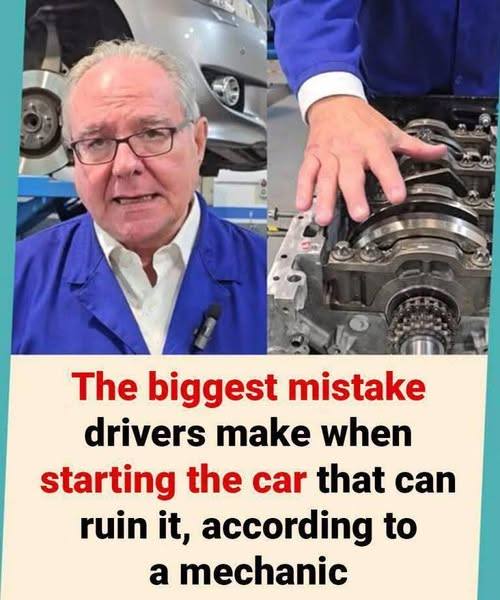
Most drivers start their car the same way every day without giving it a second thought. But according to professional mechanics, a surprising number of people are unintentionally harming their engines before they’ve even left the driveway.
And the worst part?
It’s a simple mistake that takes only seconds to avoid.
The #1 Mistake: Revving the Engine Immediately After Starting
Many drivers turn the key (or push the start button) and instantly press the gas pedal to “warm up” the engine or hear it roar.
Mechanics say this is one of the fastest ways to cause unnecessary wear and long-term damage.
Why It’s So Harmful
When you first start your car—especially on a cold engine—your motor oil hasn’t fully circulated yet.
Oil is what protects internal engine components from grinding together.
Revving too quickly means:
- The engine runs at high RPMs before lubrication reaches all the moving parts
- Metal components experience extra friction
- The engine works harder while still “dry”
- Premature wear occurs on pistons, bearings, and cylinders
Over time, this habit can lead to rough idling, reduced fuel efficiency, and even costly repairs.
What You SHOULD Do Instead
Mechanics recommend a simple rule:
Let your engine idle for 10–30 seconds before driving.
This allows the oil pump to fully circulate lubrication through the engine.
You don’t need to “warm up” your car for long—modern engines don’t require lengthy warm-ups like older vehicles. But those few seconds of idling make a big difference.
Then, once you start driving, avoid hard acceleration for the first few minutes. Drive gently to let your fluids reach optimal operating temperatures.
Other Starting Mistakes Drivers Often Make
Mechanics also warn against these common habits:
1. Starting with the heater or AC already on
This puts extra load on the engine and electrical system right from ignition.
2. Turning the key too quickly
Not letting the dashboard lights cycle can affect sensors and fuel pressure.
3. Ignoring warning lights
Even small issues—like low oil or battery warnings—can worsen dramatically if you keep starting and driving.
4. Starting the car with the steering wheel locked hard
This stresses the power steering system and can damage the ignition components.
Why These Habits Matter
Your engine is the heart of your vehicle.
Most major engine repairs—timing chain issues, bearing failures, and oil starvation damage—begin with small habits that wear down parts over thousands of starts.
Fixing these mistakes now can:
- Extend the life of your engine
- Improve fuel economy
- Reduce mechanic visits
- Save thousands of dollars in repairs over time
Final Thought
Starting your car may seem like a simple, everyday task, but the way you do it matters.
Avoiding just one common mistake—revving the engine immediately—can dramatically improve your vehicle’s health and longevity.



